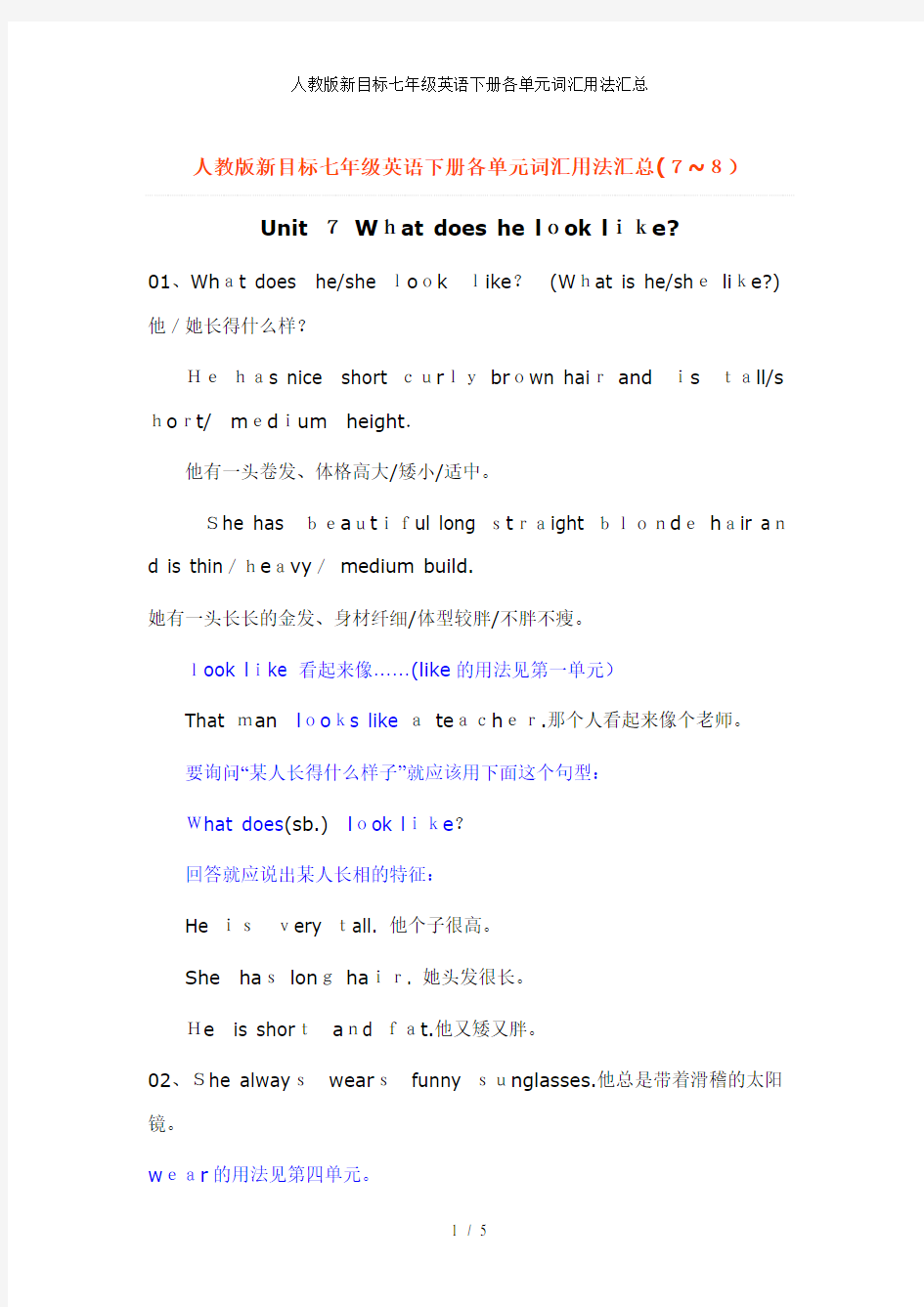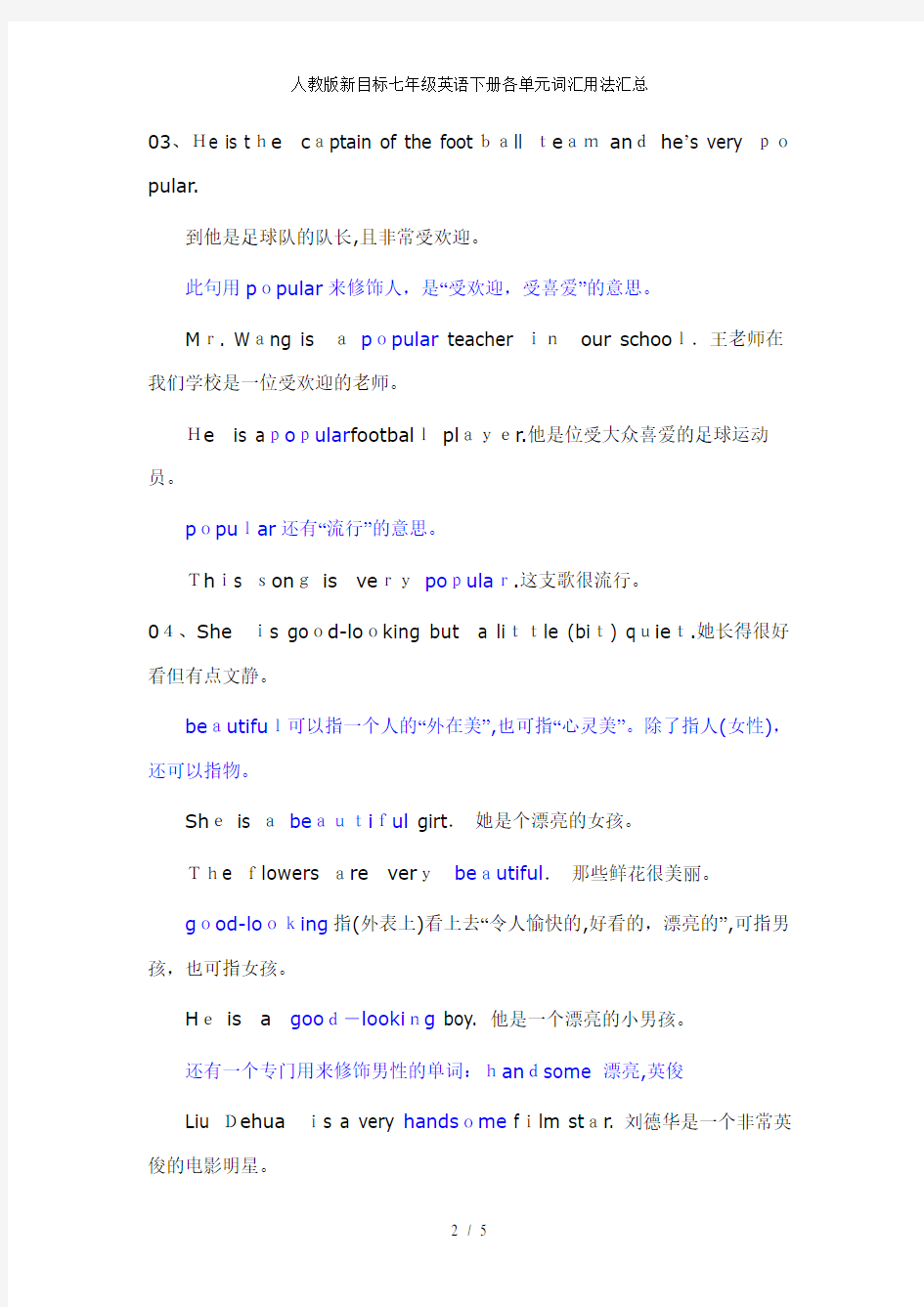

Unit 7What does he look like?
01、What does he/she looklike?(What is he/shelike?)他/她长得什么样?
Hehas nice short curlybrown hairandistall/s hort/medium height.
他有一头卷发、体格高大/矮小/适中。
She hasbeautiful long straight blondehair and is thin/heavy/medium build.
她有一头长长的金发、身材纤细/体型较胖/不胖不瘦。
look like 看起来像……(like的用法见第一单元)
That man looks likeateacher.那个人看起来像个老师。
要询问“某人长得什么样子”就应该用下面这个句型:
What does(sb.)look like?
回答就应说出某人长相的特征:
He isvery tall. 他个子很高。
She haslonghair. 她头发很长。
He is shortand fat.他又矮又胖。
02、She alwayswearsfunny sunglasses.他总是带着滑稽的太阳镜。
wear的用法见第四单元。
03、He is the captain of the football teamandhe’s very popular.
到他是足球队的队长,且非常受欢迎。
此句用popular来修饰人,是“受欢迎,受喜爱”的意思。
Mr. Wang isapopular teacher inour school.王老师在我们学校是一位受欢迎的老师。
He is apopular footballplayer.他是位受大众喜爱的足球运动员。
popular还有“流行”的意思。
This songis verypopular.这支歌很流行。
04、Sheis good-looking but a little (bit) quiet.她长得很好看但有点文静。
beautiful可以指一个人的“外在美”,也可指“心灵美”。除了指人(女性),还可以指物。
Sheis abeautiful girt.她是个漂亮的女孩。
The flowers are verybeautiful.那些鲜花很美丽。
good-looking指(外表上)看上去“令人愉快的,好看的,漂亮的”,可指男孩,也可指女孩。
Heis a good-looking boy. 他是一个漂亮的小男孩。
还有一个专门用来修饰男性的单词:handsome 漂亮,英俊
Liu Dehuais a very handsome film star. 刘德华是一个非常英俊的电影明星。
05、Sheloves telling jokes and she neverstopstalk ing.她喜欢讲笑话且总是讲个不停。
stop动词(v.)停,停止
注意stop doing与stoptodo的区别:stop doing停止做某事When teacher came in,the students stoppedtalking.当老师走进来时,学生们停止了讲话。
stoptodo停下(原来所做的事情)去做(另一件事)
When he saw me, hestopped to say hello to me.当他看见我时,他停下来向我问好。
06、He hasa beard/a mustache.他留着胡须。
07、I don’thave a new look,but hedoes.我的外貌没有变化,但是他有。
“look”在这里是名词,作“外表”讲。
08、Nobody knows me.没人认识我。
09、Do you remember Johnny Dean,the popsingerwithfunny glasses?
你还记得那个戴着滑稽眼镜的流行歌手约翰尼?迪安嘛?
with与后面的名词一起构成一个介词短语,作singer的定语。
10、This person ismedium height. Shehasshort curly hair.这个人中等身高,他有着弯曲的头发。
Unit8 I’d like some noodles.
01、Whatkindof noodles would youlike?你想要什么样的面条?
I would like beef/mutton/chicken/ cabbage/ potat o/tomatonoodles.
I would like noodles withbeef/mutton/chicken/
cabbage/tomatoes/potatoes.
我要牛肉/羊肉/鸡肉/甘蓝/土豆/西红柿面条。
02、What sizebowl ofnoodles wouldhe like?他想要多大碗的?
He wouldlike a small/ medium/large bowl of noo dles.
他要小/中/大碗的。
wouldyoulike的用法见第一单元“like”用法。
03、In/at a noodle/dumplinghouse= in/ ata house of noodles/dumplings.在面条/饺子馆。
04、We have somegreat specials.我们有一些很好的特色菜。
05、Special1has beef andonions, andis justRMB10 for15.
特色菜1有牛肉和洋葱,售价仅人民币10元15只。
06、We also have orangejuiceandgreen tea.我们也有桔子汁和绿茶。
also表示“也”,放在肯定句中,在be动词和情态动词后,实意动词前。如:Lucy islistening to theradio, Lily isalsolistening.露茜正在听收音机,莉莉也在听。